“A few years ago my mom helped me get my first elk, and then we had to try and figure out how to pack it out, just the two of us. I mean we’re strong, and women are smart. We can always figure it out. We always find a way to do it.”
For Montana hunter and onX Software Engineer Emily Sior, her appreciation of her mom and grandma stems not only from home life, but also from hard-earned experiences hunting with them in the craggy mountains and vast prairies of Montana. Stories like the one above, where good old-fashioned ingenuity and hard work dictate a successful day in the mountains, are foundational for the three generations of Sior family hunters.
Grandma Bev, Emily’s grandmother, has been hunting Montana wilderness for more than 50 years, and knows that hunting isn’t just about putting meat on the table. “Every time I hunt with my daughter and granddaughter is special,” she notes. “Being together and sharing the excitement of seeing game, the beauty of the landscape, the labor in retrieving a carcass, and the warmth of a pickup cab, cabin, or fire after a cold, wet, miserable hunt… it makes it special.”
When asked to recall some of her most memorable hunts, Emily’s mother Amanda—in true Montana fashion—recalls a -14F degree elk hunting trip near Dillon, Montana. It just goes to show that in good company and with the right equipment, foul weather can still provide some lasting memories.
We had a chat with Emily, her mom Amanda, and her grandmother Bev about what hunting means for them, and how it’s become a time to enjoy each other in the wide open spaces of Montana.
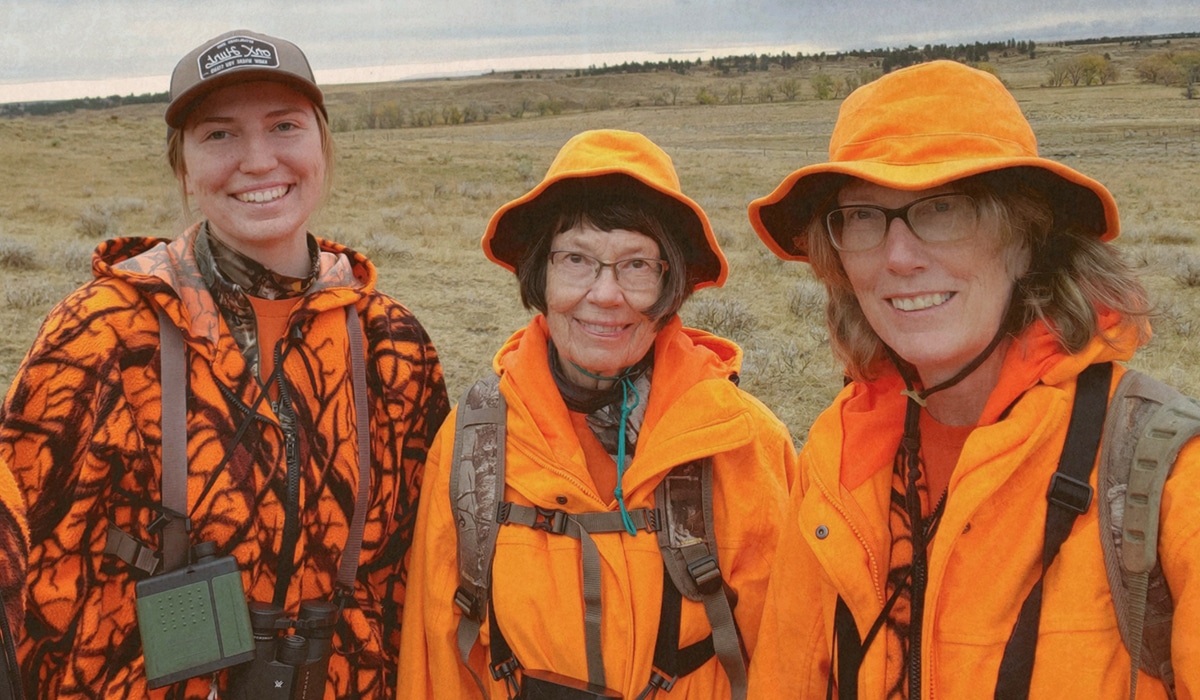
—- — —
It’s rare to see three generations of women hunting together. What brought each of you into hunting, and how much of that decision was influenced by family? How young were you when you started heading out into the mountains?
Grandma Bev: I got into hunting by going out with my husband. He was a “late in life” child and grew up listening to his dad’s hunting stories. Thus, he had a great interest in hunting but he had no one to hunt with until we married and I became the hunting partner. At first, I just followed without a rifle, and I was fine with that as I was concerned about becoming lost. Then my father-in-law gave me his rifle and I started to hunt by myself. We would separate at the truck and meet back at a specific time (before dark). If one of us was successful we would fire signal shots, as there were no radios available. As I said, I was afraid of becoming lost so my first year was spent on the side of mountains watching the truck. I finally realized that what goes up must come down so I started hunting ridges, trails, and closed roads—where there was no one in the 1950s and 1960s. We started taking our two children hunting when they were three and five years old. Sometimes we would camp in a tent, and later a trailer, near the hunting areas. My father-in-law would also come, helping with the children, minding the campfire, and telling stories.
Amanda: I was introduced to hunting initially by my parents. I went on a few hunts as a youth, trailing behind my mother, trying my best to carefully step where she stepped without making a noise, camping in the freezing cold, and seeing the antelope run faster than our bullets. I did not truly take up hunting until late into my adult life with the continued support of my parents and husband.
Emily: I started hunting from a very young age, going out with my parents and grandparents, trying to stay quiet and mimic their movements. Every year we would go antelope hunting in eastern Montana, and they humored us kids (I have a younger brother and an older sister). I’m not sure how they got much hunting done since they would take us to sand formations so we could climb around them, find geodes and crack them open, and find fossils. I started hunting with a rifle when I was 12 and got my first deer just up the county road from my grandparents house on nearby public land. We do the majority of our hunting around my grandparents’ and now my parents’ property since it is very close to public land. We’ve always had a family tradition of hunting with partners because we like to share stories and experience the hunt together. I primarily hunt with my dad. We try to do an antelope hunt every year (if we get drawn), an elk hunt in Dillon, and always a hunting extravaganza over Thanksgiving break.
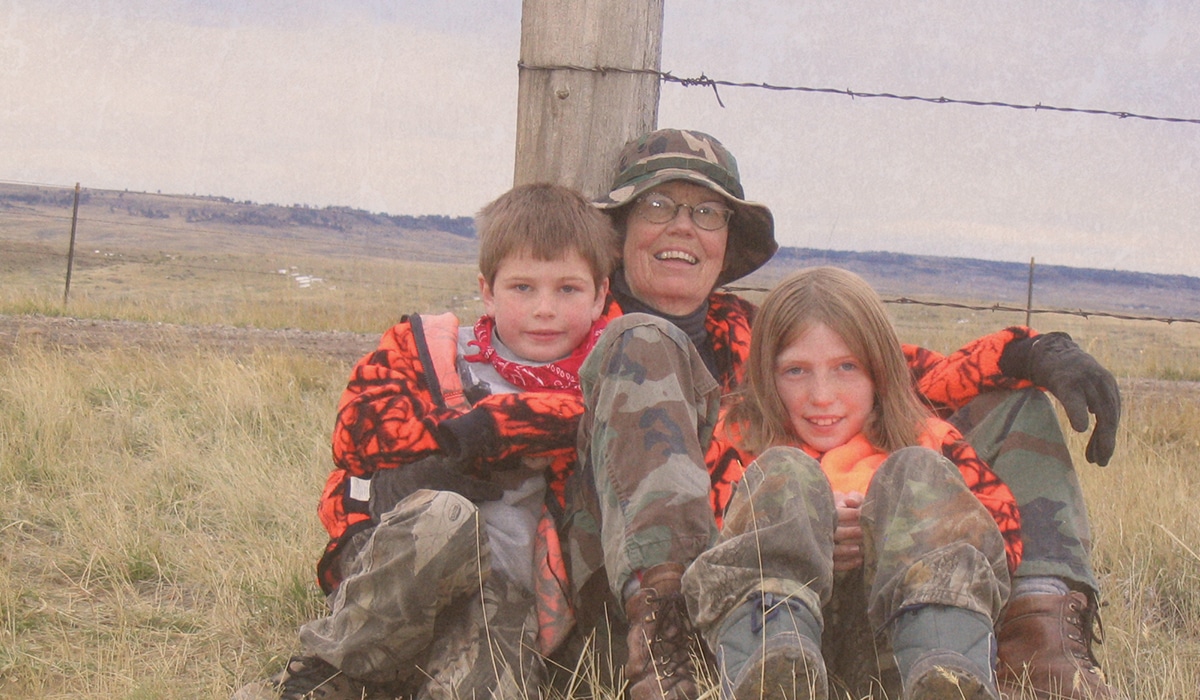
Grandma Bev: Hunting is something we have shared since the beginning of my daughter and granddaughter’s lives. If anything, hunting has strengthened our relationship. The only change would be in who’s in charge. I listen and usually comply with suggestions made by my daughter, and now my granddaughter is still listening but also starting to alter those suggestions.
Amanda: Not only hunting, but also fishing, hiking, and mushrooming, make up the basis of activities we share together. My mother, daughter, and I have learned each other’s strengths, weaknesses, and how to work together to pack out an elk, hunt a buck in the rut, use our GPS to find the best access to fish a stream, and celebrate our first mushroom finds. Each year we take girls’ hunting and fishing trips, just the three of us, which continue to strengthen our bond by giving us new situations to handle and new memories to share.
Emily: Our mutual love of the outdoors is the foundation of our relationship. I don’t remember a time when I wasn’t hunting; I’ve always done it every autumn with my family. The best moments of my life are spending time in the mountains with my loved ones. The women hunters in my family outnumber the men, and I’ve always been inspired by my mom and grandma for being strong, independent women.
Montana is well-known for its wide variety of hunting terrain. From the sweeping prairie of eastern Montana to the craggy peaks of the western side of the state, we’re lucky to have plenty of productive hunting terrain nearby. If you could pick one region to hunt for the rest of your life, where would it be?
Grandma Bev: Because of my age, I would pick areas in southwestern Montana. The terrain is gentler than my home hunting grounds and visibility is better. There are more natural meadows and the trees are spaced out.
Amanda: I like Montana because I am familiar with it. I don’t have to drive far, I can hunt different species and terrain, and the access to public land gives you the freedom to hunt most areas of the state.
Emily: The area around my grandparents’ and parents’ property will always hold a special place in my heart. Now, hunting is not easy there—too many trees. That’s why we always take an elk trip to Dillon. I also love eastern Montana and the sagebrush plains. Antelope hunting is my favorite.
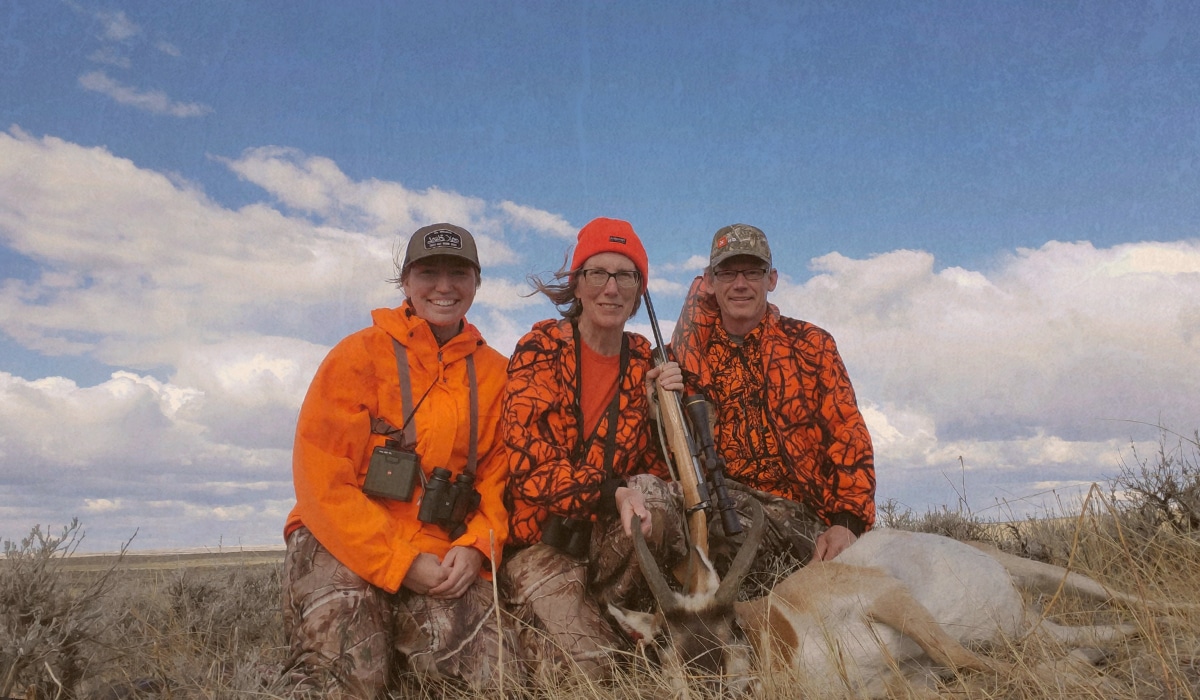
For each of us, hunting traditions take on a different look. For some it’s food and cooking, for others it’s the ritual of gear prep and planning the best wall tent camp. Every hunter gets something different out of the process. What do you enjoy most about the hunting tradition?
Grandma Bev: I enjoy the planning and anticipation of being successful.
Amanda: Camaraderie. Hunting stories at the end of the day; planning our next hunt for the morning. The peacefulness and just the raw nature of the forest—the open skies and smell of the sagebrush plains.
Emily: Spending time with my family. We have so many great stories and memories from all our hunting experiences. I especially love Thanksgiving time; hunting for four or five days straight, eating good food, telling stories after it’s too dark to hunt. We also always take a shot of peppermint schnapps when someone is successful.
Hunting with family is a very special undertaking. What advice would you give for hunters looking to get other family members involved? What are your tips and tricks to help make a new hunter’s first time out in the field an enjoyable, productive experience?
Grandma Bev: Dress appropriately: boots, hats, gloves—keep the hunter warm. Respect physical limitations; choose a hunt that’s not too strenuous or long. Bring along lots of snacks and water, and keep the hunt interesting by noticing land formations, rocks, plants, tracks, etc.
Amanda: It’s all about the outdoors and nature, really—that’s the hunting experience for me. Always emphasize the experience. Take them with you on short trips to start, in decent gear, in decent weather… as with anything, you don’t want their first few experiences to be miserable with sore feet and frozen fingers. With a new hunter, never put any pressure on them, and be willing to hunt with them until they choose to hunt alone (if they ever want to).
Emily: Same thoughts as above. If they don’t want to carry a rifle or are not comfortable carrying a rifle but just want to see what it’s about then, bring them along. Explain what you’re looking for, what you’re doing, and point out the beauty of the landscape around them.
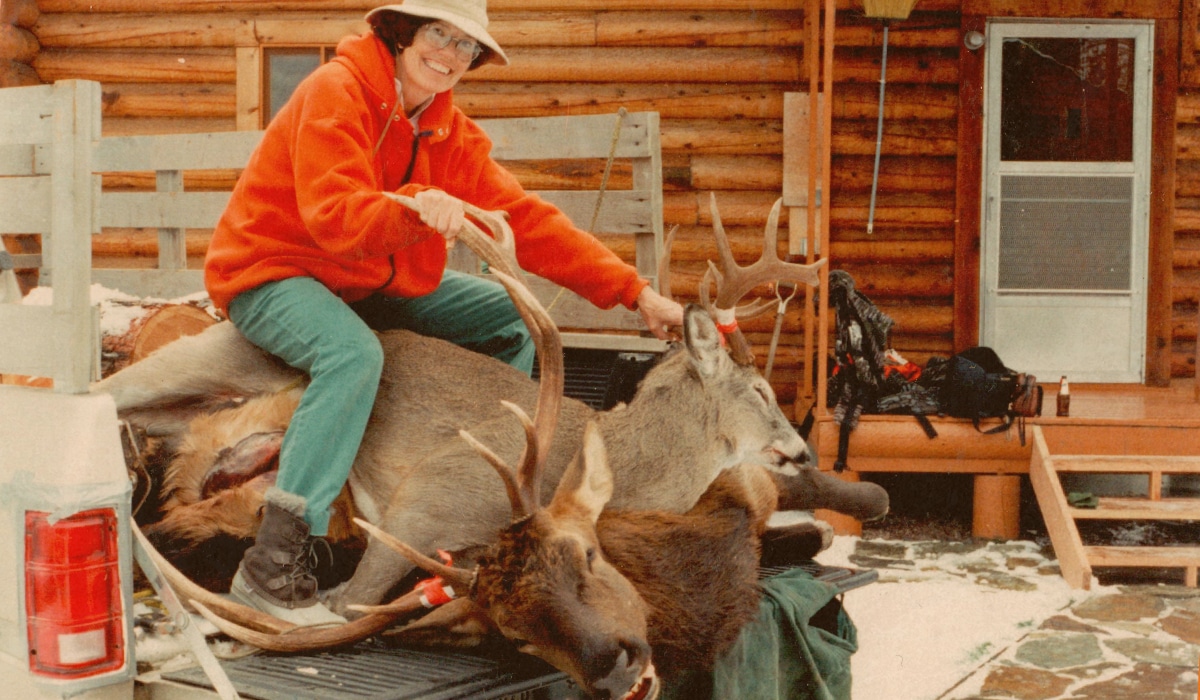
Any favorite recipes you three have developed / used over the years?
Grandma Bev: Neck Meat Soup. We also like to get teriyaki sticks and smokies. One tip for anyone processing meat: always remove the white membrane before cooking steaks or chops.
Neck Meat Soup from Grandma Bev
Ingredients:
- 2-3 pound neck roast
- 2 C beef bouillon
- 2 t onion powder
- 1 T soy sauce
- 1 T Worcestershire sauce
- Sprinkle of Johnny’s Seasoning Salt
- 1/2 C chopped onion
- 1 C chopped celery
Cooking:
- Put meat and beef bouillon in a crockpot or pressure cooker, and add onion powder, soy sauce, Worcestershire, and Johnny’s Seasoning Salt. Cook until meat falls off the bone, then shred or cut into bite-size pieces.
- Saute onion and celery until tender. Combine meat, onion, celery, and broth into a large pan. Add more broth, carrots, and your favorite starch: rice, potatoes, or pasta.
Amanda’s Honey Ginger Whitetail Steaks
Ingredients:
- ½ C red wine vinegar
- 3 T low-sodium soy sauce
- 2 T honey
- 1 T oil
- 1 t ground ginger
- ¼ t cayenne pepper
- 1 pound venison steak, 1 inch thick
Preparation:
Prepare the marinade by combining the red wine vinegar, soy sauce, honey, oil, and cayenne pepper in a large bowl or resealable plastic bag. Submerse the steak in the marinade, then cover and seal. Chill at least 30 minutes or as long as 24 hours, turning the steaks occasionally. Longer marinades will help tough or gamey animals.
Cooking:
- Preheat the propane barbeque on high, then turn down to medium. Or start four dozen charcoal briquettes and begin cooking when the coals are white hot.
- Drain the steak and discard the marinade. Grill four inches above the heat for about five minutes to a side, until medium rare. Serve with potato salad and a plate of garden tomatoes and cucumbers, sliced thin and sprinkled with freshly ground black pepper.
We all have our favorite parts of the onX Hunt App. What’s your most-used onX Hunt feature, and why do you like it?
Amanda: We use our GPS for a lot more than hunting… finding public/ private property boundaries is extremely useful, and so being able to turn on the specific layers that show these. And, of course, the fact that it shows us where we are at the moment. We also look at the locations of roads and the topography, and then measuring distances between two points.
Emily: Offline Maps and Tracker. Almost everywhere I hunt there is no cell service so I have to make sure to save Offline Maps. I always use my Tracker to see how far I hike, and I also drop Waypoints when we see something important or to mark a kill. And I use a Waypoint to mark the truck so I know where we parked.
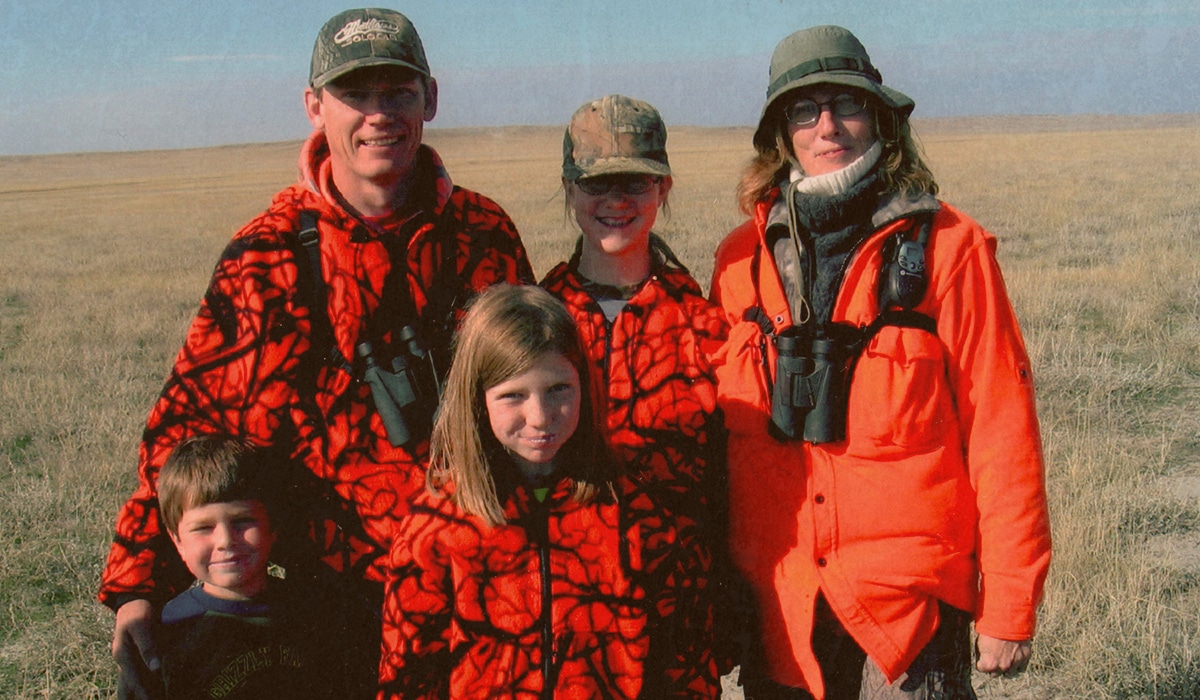
Emily’s Take on the Philosophy of a Hunting Family
Our philosophy is that we just like to hunt for the experience. We’re not really trophy hunters; we just like to go out in pairs. We hunt in pairs because we like to share the experience together; tell stories—it’s just more fun that way. We just do a lot of hunting together, then come back on our hunting trips and reminisce about it together.
The basis of our relationship is really all around the outdoors. We do everything together. Aside from hunting, we go fishing, mushroom hunting, hiking… everything. That’s really the thing I love about my family—we have this huge love for the outdoors and appreciating nature. If I didn’t have hunting to share with my family, I think our relationship would be quite a bit different because we wouldn’t have that combined interest. It’s something we can bond over.
We all have a shared value that appreciating the outdoors and being outside is really important. I don’t really know any different because I grew up that way, and that’s how it’s always been for me.